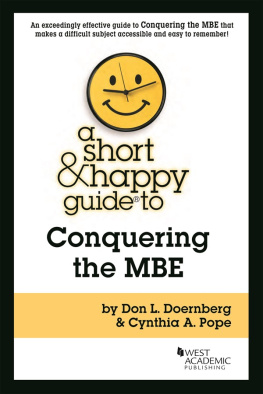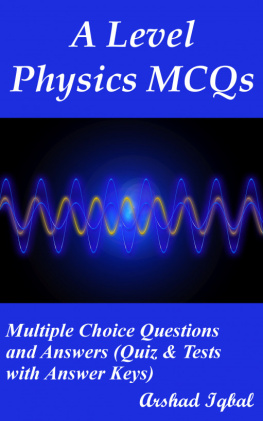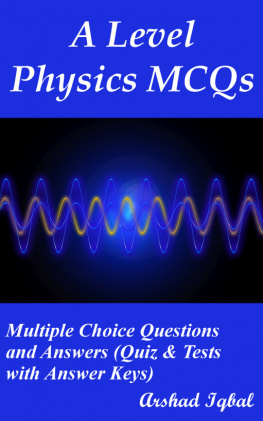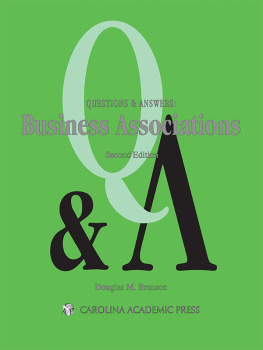West Academic Publishings Emeritus Advisory Board
Jesse H. Choper
Professor of Law and Dean Emeritus
University of California, Berkeley
Yale Kamisar
Professor of Law Emeritus, University of San Diego
Professor of Law Emeritus, University of Michigan
Mary Kay Kane
Professor of Law, Chancellor and Dean Emeritus
University of California, Hastings College of the Law
Larry D. Kramer
President, William and Flora Hewlett Foundation
James J. White
Robert A. Sullivan Emeritus Professor of Law
University of Michigan
West Academic Publishings Law School Advisory Board
Joshua Dressler
Distinguished University Professor Emeritus
Michael E. Moritz College of Law, The Ohio State University
Meredith J. Duncan
Professor of Law
University of Houston Law Center
Rene McDonald Hutchins
Dean and Joseph L. Rauh, Jr. Chair of Public Interest Law
University of the District of Columbia David A. Clarke School of Law
Renee Knake Jefferson
Joanne and Larry Doherty Chair in Legal Ethics &
Professor of Law, University of Houston Law Center
Orin S. Kerr
Professor of Law
University of California, Berkeley
Jonathan R. Macey
Professor of Law,
Yale Law School
Deborah Jones Merritt
Distinguished University Professor,
John Deaver Drinko/Baker & Hostetler Chair in Law
Michael E. Moritz College of Law, The Ohio State University
Arthur R. Miller
University Professor, New York University
Formerly Bruce Bromley Professor of Law, Harvard University
Grant S. Nelson
Professor of Law Emeritus, Pepperdine University
Professor of Law Emeritus, University of California, Los Angeles
A. Benjamin Spencer
Dean & Chancellor Professor of Law
William & Mary Law School

Conquering the MBE
Don L. Doernberg
Professor of Law Emeritus
Pace University Elisabeth Haub School of Law
Sometimes Visiting Professor of Law
University of the Pacific McGeorge School of Law
Cynthia A. Pope
Member, California and New York Bars
A SHORT & HAPPY GUIDE SERIES

The publisher is not engaged in rendering legal or other professional advice, and this publication is not a substitute for the advice of an attorney. If you require legal or other expert advice, you should seek the services of a competent attorney or other professional.
a short & happy guide series is a trademark registered in the U.S. Patent and Trademark Office.
2021 LEG, Inc. d/b/a West Academic
444 Cedar Street, Suite 700
St. Paul, MN 55101
1-877-888-1330
Printed in the United States of America
ISBN: 978-1-64708-837-8
About the Authors
Don was on the full-time faculty at Pace University School of Law from 1979 to 2016. He has taught Civil Procedure, Conflict of Laws, Criminal Law, Criminal Procedure, Federal Courts, Torts, and the Law of Church and State. When he left Pace in 2016, Cyndy and he moved to California, and where for a few years he was Sometimes Visiting Professor at University of the Pacific McGeorge School of Law.
Upon graduation from law school, Cyndy was in-house counsel for IBM for nine years but then decided that she wanted to be a full-time mom. That turned out to be very fortunate, because we have a child with special needs. We became quite familiar with Special-Education Law and conducted a limited practice, representing children who required services under the Individuals with Disabilities in Education Act (IDEA) or accommodations under the Americans with Disabilities Act (ADA), taking all cases pro bono . We also became Parent Members of our school districts Committee on Special Education and served in that capacity for about fifteen years.
Both of us are members of the New York and California bars.
Don Doernberg
Cyndy Pope
December, 2020
Table of Contents
. Some MBE Patterns and an Important
Caution
A Short & Happy Guide to Conquering the MBE

Prologue
One of the hoops you must jump through to become a licensed attorney in the United States is the Multistate Bar Examination. It takes up a day of states two-day bar examinations (though some states count it as somewhat less than 50% of the score). It ostensibly examines in seven areas: Civil Procedure, Constitutional Law, Contracts, Criminal Law, Evidence, Property, and Torts. Realize, however, that Constitutional Law also takes in some areas that most law schools would characterize as Federal Courts or Criminal Procedure, and Criminal Law may include procedure questions as well.
There are two possibilities with respect to the MBE: you can conquer it, or it can conquer you. We recommend the former. We present here a study method we adopted in 1985 when we were studying for the California Bar Examination. It was the second bar examination (no, no, not the second try ) for each of us; we were already admitted in New York. Don is so old he had never even seen an MBE; it did not exist when he took the bar in New York. Cyndy took the New York Bar Examination in 1983. When her in-house-counsel job at IBM moved to California, she had to take the California test because, unlike many other states, California requires that all in-house counsel take the California examination irrespective of how many other states bars they may belong to.
As we were preparing, we began to use practice multiple-choice questions as review and study tools rather than simply as assessment tools. Most students use practice questions simply to see how they are doingas summative assessment. It seems to be a separate process from actually reviewing and studying subject matter, but it need not beindeed, it should not be. Practice questions, done properly, are not just evaluation tools, they are indispensable study tools. This also makes them less intimidating, which brings us to a caution.
Students often characterize themselves as terrible at multiple-choice questions. And they repeat that to themselves, over and over again, in various ways. That is not helpful; in fact, it is destructive. It is misdirected psychological conditioning that simply reinforces that particular feeling of inadequacy. Dont do that to yourself. If multiple-choice questions have been a challenge for you in the past, fair enough. But dont project it into the future; thats just talking yourselves out of being able to become proficient. We designed this book to teach you how to become proficient.
Please do keep in mind that we seek to present here a system of study for the MBE. It is to prepare you to get the most out of your studying by using multiple-choice questions as study tools. It is not a substitute for doing practice examinations under examination conditions, but we hope you will find it effective as a method of substantive review for both the practice examinations and for the Main Event.
A few states have a partial third day.
Don did not have to take the examination at all but decided to (1) mostly to keep Cyndy company and (2) but secondarily to see the examination his students were encountering. He is a bit of a masochist.
Just think of how you would react if, when you are approaching an important challenge, someone else followed you around, reminding you every few moments how awful you are at whatever skill is involved. How long would it take before you at least felt like taking a swing at that person? (We trust you would not indulge the feelingthink Torts.) Well, its even worse when you are the source of the unpleasant communication. When someone else says something derogatory about us, we can always simply tell ourselves that that person is an idiot. When we think derogatory things about ourselves, its really quite difficult to write that off as coming from someone who knows nothing. You would never permit someone else to do that to you, and thats fine. But its even more important that you not do that to you.









